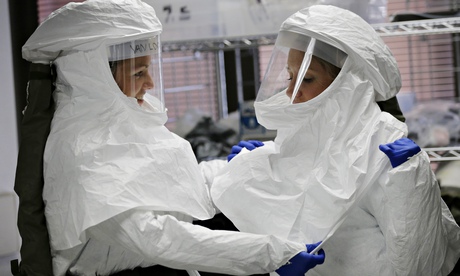
The Ebola epidemic in west Africa may have reached a turning point, according to the director of the Wellcome Trust, which is funding an unprecedented series of fast-tracked trials of vaccines and drugs against the disease.
Writing in the Guardian, Dr Jeremy Farrar says that although there are several bleak months ahead, “it is finally becoming possible to see some light. In the past 10 days, the international community has belatedly begun to take the actions necessary to start turning Ebola’s tide.
“The progress made is preliminary and uncertain; even if ultimately successful it will not reduce mortality or stop transmission for some time. We are not close to seeing the beginning of the end of the epidemic but [several] developments offer hope that we may have reached the end of the beginning.”
Farrar’s comments come as the World Health Organisation confirmed that the number of Ebola cases in Liberia has started to decline, with fewer burials and some empty hospital beds. But the WHO warned against any assumption that the outbreak there was ending.
“I’m terrified that the information will be misinterpreted,” said Dr Bruce Aylward, assistant director-general in charge of the Ebola operational response. “This is like saying your pet tiger is under control. This is a very, very dangerous disease. Any transmission change could result in many, many more deaths.”
Data appears to show that the number of burials and lab tests requested for the virus are down and the numbers of empty beds in treatment centres are up – there have been reports of as many as a hundred. Aylward said huge efforts to educate and inform the community on the risks of Ebola and how to avoid infection and bringing in safe burial practices may have made the difference.
But infections could shoot up again, as they did in Guinea. “The danger is that instead of a trend that takes us down to zero, we end up with an oscillating pattern,” he said. Getting to zero will involve grindingly hard work, identifying every Ebola case and tracing all the contacts. Without that effort, Ebola will remain at a lower but still dangerous level.
There have now been 13,703 cases, said Aylward, and he expected there would have been over 5,000 officially recorded deaths, although that number is not yet confirmed. Many cases and deaths are unrecorded. The death rate is 70%, although slightly better in treatment centres.
The Wellcome Trust announced it was funding the first human trials of a third vaccine, to start imminently, so that it can be tested in health workers and burial teams in west Africa in December, alongside two others.
The vaccine, called rVSV-EBOV, was developed by the Public Health Agency of Canada. So far it has been tested only in monkeys, but in the hope it could prove effective, 800 vials have been donated by the Canadian government. The safety trials – in which people at no risk of catching Ebola are vaccinated to ensure there are no serious side-effects – will start in Germany, Switzerland, Gabon and Kenya. The Wellcome Trust is donating £3.1m to enable the collection of safety data, overseen by the World Health Organisation.
The Wellcome Trust’s experts describe the VSV vaccine candidate as one of the most promising. There are two others that are more advanced in clinical trials – one made by the British pharmaceuticals company GlaxoSmithKline and the other by Johnson & Johnson in the US. Both will move into trials in west Africa in December.
Farrar says the grounds for hope rest on three developments. “The first advance has been a step change in urgency from the rich world, which is finally starting to commit resources and people on the scale required,” he says. The EU has now nearly doubled its funding to €1bn (£790m) and large UK and US investments “mean that money should no longer be a barrier”. The WHO, initially so slow to respond, is now showing leadership.
“Finally and potentially most significantly, vaccine development has changed up a gear,” Farrar says. A safe and effective vaccine could transform the situation.
But he concludes that the huge effort must continue.
“The pressure must not let up. The constructive diplomacy of recent days has not saved a single life, nor protected anybody from infection. The epidemic’s exponential curve means it will get worse before it gets better. We have not yet begun to control Ebola, and the new interventions could yet fail. But if the world lives up to its promises, the past week may come to be seen as the turning point.”
